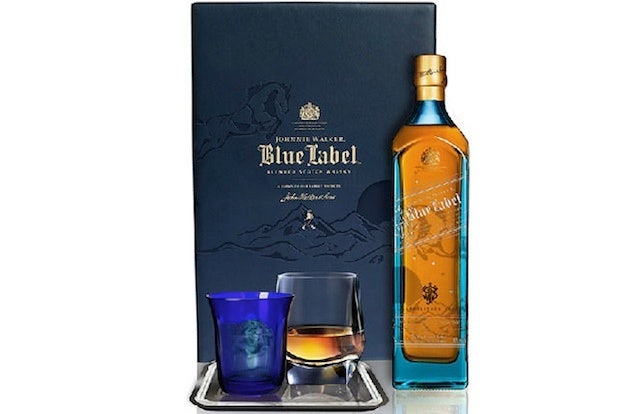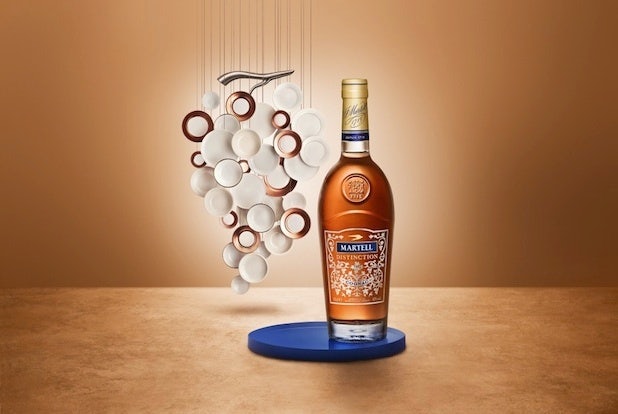
The special year of the horse Scotch blend by Diageo's Johnnie Walker. (Sina Weibo/Johnnie Walker)
Chinese New Year may be a festive time for celebration, but not for the top global drinks companies this year. As China’s anti-corruption crackdown eats into profits for conglomerates such as Diageo, Pernod Ricard, Rémy Martin, and LVMH’s Moët Hennessy, the brands are coming up with a variety of strategies to stave off further China decline.
The four companies have all recently lamented the effects of the ongoing Chinese government campaign, which bans both luxury gift-giving to officials and fancy banquets with tables full of high-end Cognac and baijiu. While all of these businesses have been hit hard by the campaign, they each have their own ways of handling the crisis in China. Their strategies include staying the course while upping their marketing budget, introducing bottles at lower price points, and targeting the country’s young partygoers. Read more to see what each company is doing.
Diageo#
At the end of January, the world’s biggest spirits company recently reported a 22 percent drop in total sales in China for a six-month period, citing the Chinese government’s anti-corruption crackdown as a direct cause. Its hardest-hit category was baijiu brand Shui Jing Fang, which experienced a precipitous 66 percent drop in sales. Johnnie Walker Black and Red Label shipments to China have declined, and the China slump has led to a 6 percent overall drop in top-line sales for East Asia. Even Chinese New Year sales are “unlikely to see a rebound,” said the company, which doesn’t plan on a growth rebound until 2015.
In order to cope, the brand will be focusing on its bright spots in China—ultra-premium Scotch and brands at middle-class price points aimed at the consumer market. Despite the fact that many of Diageo’s top-shelf brands have been hit by the crackdown, wealthy Chinese consumers are still buying high-end Scotch. Bespoke blends that go for $3,000 to $5,000 a bottle are doing well in the country, said Diageo CEO Ivan Menezes in a company presentation, and Johnnie Walker Blue was up 60 percent in China for the six-month period.
“This is really going directly to the consumer for consumption, and is not kind of dependent on gifting or government entertaining,” said Menezes. This focus on the consumer, rather than the official “gifting” market, has helped some of Diageo’s mid-range brands as well. For example, the company reported 37 percent China growth for Bailey's, which is “opening up a whole new consumer opportunity,” said Menezes.
Pernod Ricard#
The spirits maker won’t reveal its first-half results until February 13, but its last earnings report was less than rosy when it came to China sales. The company has warned that the Chinese government’s crackdown will slow year-end profits, and reported in October that sales for the three months ended September 30 fell by 9 percent.
In the face of slowing demand, Pernod Ricard is going for a cheaper price point and younger drinkers in order to balance the void left by the crackdown. It recently launched Ballentines Finest, a blended Scotch whisky, and Martell Distinction Cognac, in China, both of which are aimed at younger drinkers headed to karaoke clubs. At around $27 to $60 a bottle, the price points are aimed at the consumer, not the high-end gifting market. "China is and will be a key growth driver for the group," said company CEO Pierre Pringuet in October.

Rémy Cointreau#
In the company’s recent nine-month financial report, the company saw a 32 percent drop in Cognac sales for its third quarter. A major portion of this drop came from China, where Cognac makes up 40 percent of the company’s total profit. “The campaign to promote morality in China is expected to continue to adversely affect the consumption of ultra-premium products and no significant recovery can be expected due to the Chinese New Year,” said a statement by the company, which saw a “cumulative organic decline” of 18.3 percent since the start of the current financial year.
Rather than opting for steep discounts, the conglomerate is “keeping a cool head,” its CFO, Luca Marotta, said in a Wall Street Journal interview. "Giving in to pressure on prices would be a big strategic error." The company plans to boost advertising and marketing spending in preparation for when China sales “naturally” rebound, he said. Meanwhile, like Pernod Ricard, the company has also been targeting younger consumers over the past year with its focus on clubgoers through its China “Remy Dance” competitions.
Moët Hennessy#
LVMH’s drinks category was also hit by the anti-corruption campaign, said LVMH CFO Jean-Jacques Guiony during a conference call on its year-end sales report released last week. As a result, the conglomerate is engaging in “significant destocking” of its Cognac in China, and is also pursuing a "value creation strategy" for its Colosseum vintage, which "continues to sell well" in the country. The company also continues to make efforts to turn more Chinese consumers into Champagne drinkers, a task which has proven challenging with the popularity of red wine.